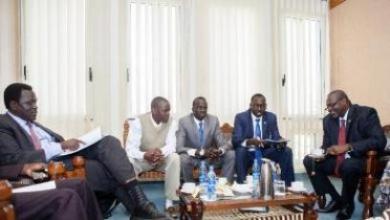S. Sudan’s rival leaders fail to strike peace deal as rebels insist on reforms
March 5, 2015 (ADDIS ABABA) – South Sudan President Salva Kiir and leader of the rebel faction of the Sudan Peoples’ Liberation Movement (SPLM-IO), Riek Machar failed to meet the deadline set by regional mediators for the two sides to strike a final and comprehensive peace deal on Thursday.

The IGAD mediators urged Kiir and Machar to “use the limited time that remains to make progress on the outstanding issues”. They further pointed out that power-sharing and security arrangements are the most important matters the parties have to settle.
“The security areas, the power sharing area, the scope of the levels … These are the critical areas that has still kept the parties apart and they are tackling them,” IGAD’s chief negotiator, Seyoum Mesfin told reporters in Addis Ababa, Ethiopia.
He added that IGAD will continue to be involved through the African Union and the United Nations to help resolve the crises in the world’s youngest nation.
Although IGAD extended the deadline, some observers still doubt the possibility of both parties reaching a final peace deal on Friday.
The UN security council on Tuesday adopted resolution which would allow to impose sanctions on the warring factions.
REBEL DEMANDS
Machar’s spokesman, James Gatdet Dak, told Sudan Tribune that the two principals remain at odds on many other contentious issues related to reforms that the rebels see more important than power sharing.
“The two principals have not agreed on almost everything else except reforms,” Machar’s spokesman, James Gatdet Dak, said when reached on Thursday evening.
He said the government was responsible for the deadlock, accusing Juba of refusing to agree on core issues without justifying their rejection.
“For instance, they agreed that federalism is a popular demand of the people of South Sudan but yet disagreed to adopt it in the peace agreement and implement it in the transitional period,” he said.
The government, he said, wanted the matter to be deferred to future permanent constitution making process for consideration.
A host of other contentious issues including governance, transitional security arrangements, wealth-sharing, power-sharing ratios and its scope, status of national legislature, elections, accountability and justice are among sticking points yet to be resolved.
On power-sharing, the rebel group demanded that it applies across the country from the national to state and local levels. However, the government rejected this, saying it would only share power at the national level in the capital, Juba, with states and counties untouched by the change.
The rebels also wanted the current bicameral national legislature dissolved and reconstituted per power-sharing ratios, arguing that the new membership would make a constituent assembly before next elections as the mandate of the current elected parliament is bound to expire soon.
In another burning point, the government also wanted new security arrangements to be confined to greater Upper Nile region where fighting is mainly taking place and that the arrangement should not include the other two regions of Bahr el Ghazal and Equatoria.
Juba argued that the war was being fought in the rebel leader’s home region of Upper Nile while the other regions of Bhar el Ghazal where president Kiir comes from and Equatoria where his deputy James Wani Igga hails enjoyed peace, hence there was no reason to include them in the process.
But the SPLM-IO faction argued that the transitional security arrangement should affect all the security organs in the country without exempting particular regions.
Dak said majority of the regular army in the country had already defected to the opposition and that a comprehensive arrangement of gradual amalgamation into a new national army was needed and effect reforms.
“This is also about comprehensive security sector reform that should affect all the security organs in South Sudan,” he added.
He further explained that the government had recently accused the rebel forces of attacking locations in Western Bahr el Ghazal, saying Juba in their allegation had already acknowledged that the war was not confined to Upper Nile region and that rebel forces were everywhere in the country.
“We have forces in Bahr el Ghazal and Equatoria regions. But they are directed to respect ceasefire and not initiate a fight,” he further asserted.
POWER-SHARING TALKS DELAYED
Dak also revealed that the rebel leader told IGAD not to negotiate on power-sharing arrangements before agreement with president Kiir on other outstanding issues.
He said Machar made it clear on Thursday to the IGAD mediators that the issue would be negotiated later on after resolving the contentious matters on governance, security arrangements, accountability and others.
IGAD approached both leaders with agenda items that carried leadership structure, power-sharing and institutional reforms for discussions on Thursday.
The two principals are expected to resume negotiations on Friday as the extended 24 hours deadline expires on 6 March.
IGAD special envoys for South Sudan announced on Thursday that president Kiir and opposition leader Machar would continue negotiations on Friday.
The Special Envoys urged the principals to use the limited time remaining to make progress on the outstanding issues of the mediation agenda.
IGAD’s chief mediator, told reporters on Thursday evening that the special envoys who were consulting with the two top leaders from Thursday morning might change the approach on Friday by again bringing them back to face-to-face negotiations.
“Today, it was separate consultation; with the envoys; that is what we have been doing today. After this consultation, then we will bring them tomorrow,” he said.
Observers still doubt whether the new added time-frame will result in to an agreement.
The UN on Tuesday announced preparation for sanctions and warned the two principals of measures that would include travel ban and assets freeze if they fail to strike a deal by the set deadline.
(ST)
